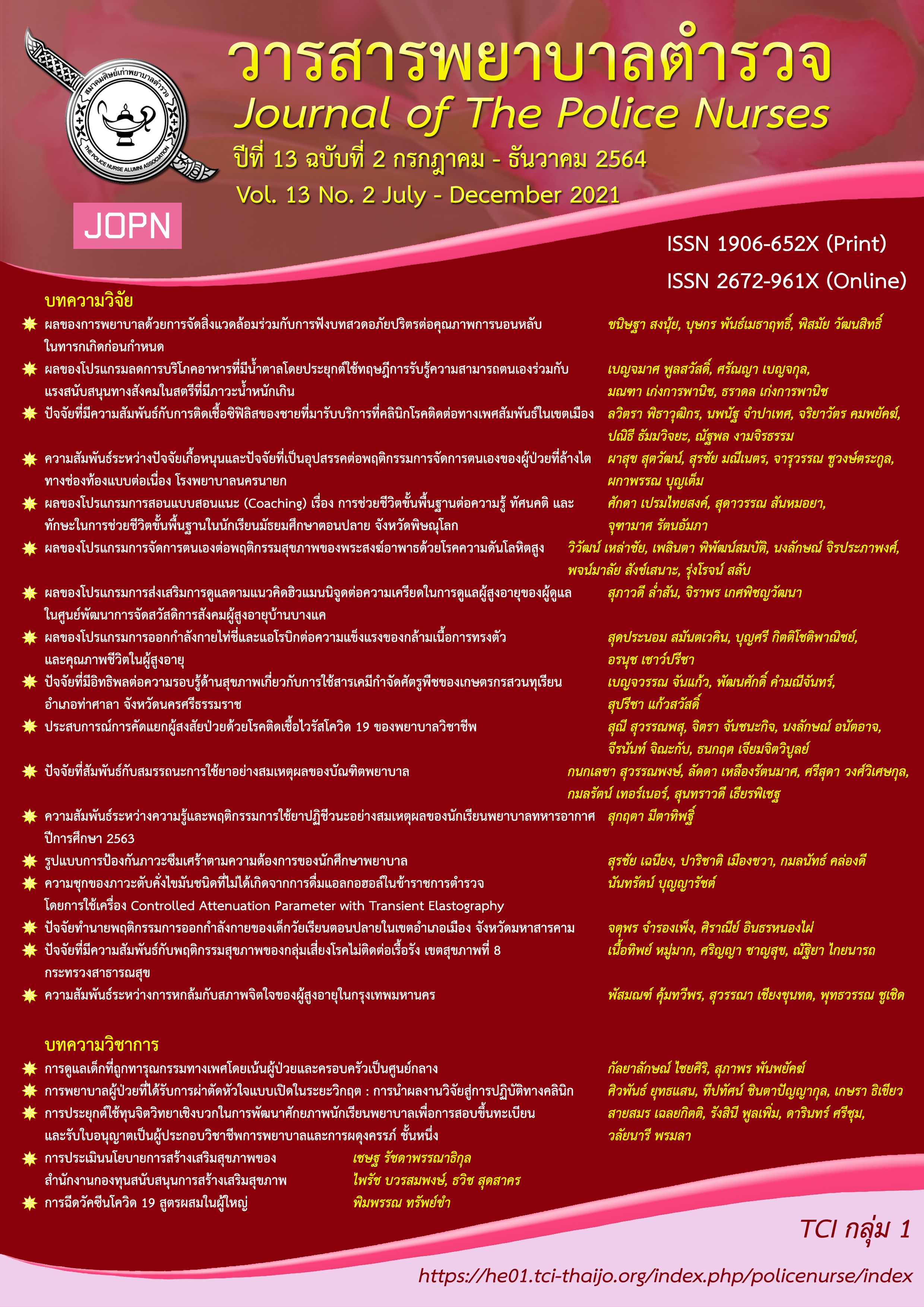EFFECTS OF A PROGRAM TO REDUCE SUGAR CONSUMPTION BY APPLYING THE SELF-EFFICACY THEORY WITH SOCIAL SUPPORT IN OVERWEIGHT WOMEN
Keywords:
program to reduce sugar consumption, self-efficacy theory, social support, overweight womenAbstract
This quasi-experimental research was aimed to study the effects of a program to reduce sugar consumption by applying the self-efficacy theory with social support. The samples were 75 overweight women who had body mass index (BMI) ³ 23 kg/m2 but not higher than 30 kg/m2 and aged between 30 to 59 years old. Thirty-seven of them were separated into the experimental group and thirty-eight women were put into the comparison group. The experiment took 11 weeks. The data collection was done before and after the experimentation on the 1st and 12th weeks by using the questionnaire. The questionnaire was tested by content validity and found to be reliable using Cronbach's alpha coefficient. The data analysis was done by using descriptive statistics such as frequency, percentage, mean, and standard deviation. The difference was tested by computing the chi-square test, paired t-test, and independent t-test.
The results showed that after the experimentation, the experimental group had a significantly higher level of knowledge about sugar consumption, perceived self-efficacy to reduce sugar consumption, and outcome expectation of reducing sugar consumption than before the experimentation. The experimental group also had significantly better/more appropriate knowledge in reducing sugar consumption behaviors than before the experimentation and the comparison group. Besides, significantly different body weight was found between the two groups. The average decreased body weight of the experimental group was found to be .40 kilograms compared to the increased body weight of .90 kilograms of the comparison group. Thus, this sugar consumption reduction program can be applied to the people in the areas that are in the responsibility of the Public Health Service Center of Bangkok Metropolis or health-promoting hospitals with similar contexts.
Downloads
References
Aekplakorn, W., Inthawong, R., Kessomboon, P., Sangthong, R., Chariyalertsak, S., Putwatana, P., & Taneepanichskul, S. (2014). Prevalence and trends of obesity and association with socioeconomic status in Thai adults: National health examination surveys, 1991–2009. Journal of Obesity, 2014, 410259. http://dx.doi.org/10.1155/2014/410259
Aekplakorn, W., PorapukKham, Y.,Pakcharoen, H., Satheanoppakao, W., Thaikla, K., . . . Taneepanichskul, S. (2011). Thai food consumption surveys report the 4th public health survey by physical examination 2008-2009. Retrieved from https://www.hiso.or.th/Hiso5/report/report1.php
Bandura, A. (1997). Self-efficacy: The exercise of control. New York, NY: Freeman and Company.
Chirawatkul, A. (2014). Statistics in research choose how to use it appropriately. Bangkok: Witthayaphat-printing.
Deehomsin, W. (2011). The Effectiveness of health education program on weight reduction among obese students in junior high school, Samutprakan province (Thesis, Master of Public Health). Faculty of Public Health, Mahidol University, Bangkok.
Health Center 10 Sukhumvit. (2017). Result of the health survey, 2014-2016. Bangkok.
House, J. S. (1981). Work stress and social support. Retrieved from https://babel.hathitrust.org/cgi/pt?id=mdp.39015071886035;view=2up;seq=72;size=125
Kunwong, M. (2010). The effectiveness of health education for weight reduction among overweight menopause women by applying the self- efficacy theory and social support at the Ban Khu subdistrict, Yangsisurach district, Mahasarakham province (Thesis, Master of Public Health). Faculty of Public Health, Khon Kaen University, Khon Kaen.
Miller, W. C., Koceja, D. M., & Hamilton, E. J. (1997). A meta-analysis of past 25 year of weight loss Research using diet, exercise or diet plus exercise intervention. International Journal of Obesity, 21(10), 941-947.
Moonsarnand, S., & Sumpowthong, K. (2016). Effects of dietary behavior modification program guideline of the DASH with self-efficacy theory and social support on reducing the risk of hypertension among pre-hypertensive patients, Aranyaprathet district, Sa Kaeo province. Journal of The Public health Journal of Burapha University, 11(1), 87-98.
Pitaksa, P. (2014). Effect of health education program for changing food consumption behavior among grade 6 students Buriram province (Thesis, Master of Public Health). Faculty of Public Health, Mahidol University, Bangkok.
Samart, S., & Sota, C. (2016). The effectiveness of health education program applying self-efficacy and stages of change for weight reduction among working age 40-49 years old group with overweight and obesity in Nongkungshern subdistrict, PhuWiang district, Khon Kaen province. Journal of the Office of DPC 7 Khon Kaen, 23(3), 34-45.
Sansing, W. (2013). Effects of a diet control program among overweight Prathomsuksa 5-6 students (Thesis, Master of Public Health). Faculty of Public Health, Mahidol University, Bangkok.
Srimong-ngam, W. (2015). The effects of health education program for weights loss by modification self-efficacy theory and social support theory for health behavior of nurses students of Ratchathani university (Thesis, Master of Public Health). Faculty of Public Health, Ubon Ratchathani Rajaphat University, Ubon Ratchathani.
Sutthirit, S. Pinchaleaw, D., & Keskomon, T. (2018). The effectiveness of self-regulation program with line application among overweight health volunteers, Tharongchang district, Suratthani province. Journal of The Police Nurses, 10(2), 433-441.
Tunsakul, S. (2005). Theory and application models in health education and behavioral science. Bangkok: Yutharint-printing.
Ungchusak, C. (2012). Sugar, health and appropriate consumption management. Retrieved from http://resource.thaihealth.or.th/library/academic/15352
West, J. A., & de Looy, A. E. (2001). Weight loss in overweight subjects following low-sucrose or sucrose-containing diets. International Journal of Obesity, 25(8), 1122-1128.
Woraphongsathorn, T. (1997). Principles of research in public health. Bangkok: Chulalongkorn university.
World Health Organization. (2015). WHO calls on countries to reduce sugars intake among adults and children. Retrieved from https://www.who.int/news-room/fact-sheets/detail/obesity-and-overweight
World Health Organization Media Care. (2017). Obesity and overweight fact sheet. Retrieved from http://www.who.int/mediacentre/factsheets/fs311/en/
Downloads
Published
How to Cite
Issue
Section
License
ผลงานที่ได้ตีพิมพ์แล้วจะเป็นลิขสิทธิ์ของวารสารพยาบาลตำรวจ















